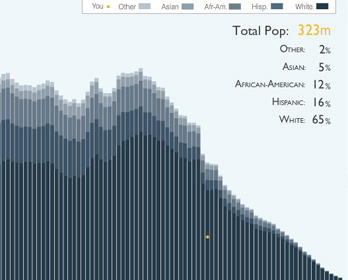Visualizing Our Future Selves

How will the country's demographics change over the next 40 years? Which states will age the fastest? How does our sex, race and ethnicity affect our health, now and later? What is the financial picture for retirees across demographics?
Experts talk about the influence of large trends in the coming four decades, but picturing ourselves 20, 30 or 40 years down the road can be difficult. This interactive allows readers to enter information about themselves and see how they fit into the aging world of the future, using the best projections from economists, biostatisticians and demographers.
Scroll down for the interactive to see what those predictions mean for people like you and read the related story to hear what the experts make of it all.
Looking Into Our Future, Ourselves
-
If you are a 50-year-old white woman, you have a 9.9 percent chance of a cancer diagnosis thus far in your lifetime and a 6.9 percent chance of diabetes. But fast forward 20 years: At 70 your risk for both diseases will roughly double, based on current trends.
If you are Hispanic, you'll face different health challenges. A 70-year-old Hispanic woman has a much higher chance of a diabetes diagnosis than a white woman — 26 percent — but a lower chance of cancer, just 7.7 percent.
As you age, you will probably see changes not only in your personal health, but also in your finances and the racial, ethnic and age makeup of your community. Epidemiologists, demographers and statisticians, analyzing current data and trends, can tell us quite a bit about those changes.
For instance, while the whole country is graying, each state is aging at a different rate. If you live in Maine, you will see the senior population skyrocket from 15.6 percent in 2010 to 26.5 percent in 2030, according to Census Bureau projections. If you live in Maryland, the increase in seniors will be less dramatic, from 12.2 percent in 2010 to 17.6 percent in 2030.
As the country as a whole is becoming more diverse, so are seniors, historically the whitest group. In 2050, 42 percent of those over 65 will be Hispanic, African-American, Asian or "other," the Census predicts.
As for your financial future, you might be reassured to know that, on average, retirees are able to maintain their pre-retirement standards of living, according to studies by the Urban Institute. How comfortable your retirement will be has a lot to do with your marital status, however. If you are divorced, widowed or never married, you will be worse off financially. A married non-Hispanic white senior, for example, has an average annual per capita income of $26,542 while someone who's not married receives only $24,487 a year.
So what does this foretell if you are a single, 30-year-old black man living in Virginia who will be 70 in 2050? If current trends continue, at age 70 you have a 27.4 percent chance of having diabetes, but an 11 percent chance of heart disease. By then, a fifth of Americans will be over age 65, although in Virginia the proportion of seniors will be slightly below the national average. You will probably keep working longer than your parents did, and will spend more than half of your income on housing.
Of course, much could change between now and then. Dr. Edward Gregg, chief of epidemiology and statistics at the diabetes division of the Centers for Disease Control and Prevention, points out that these are only projections and that people's behaviors and choices affect their future. "Definitely there are some unknowns," he says. "When you try to predict the future — that's the challenge."
